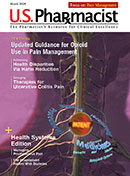In fact, the report in the Journal of the American Pharmacists Association suggests that intervention matters more than cost.
The retrospective cohort study, led by a postgraduate resident from the University of Mississippi School of Pharmacy, sought to analyze the impact of a pharmacist phone call intervention on a patient’s likelihood of receiving the second recombinant zoster vaccine (RZV) dose. It also explored the effect of patient cost on the second dose administration.
Specifically, the study evaluated the SHINGRIX call lists from 10 randomly selected pharmacies within a large pharmacy chain (Walgreens). The authors compared the percentage of patients who received the call intervention and their second RZV dose with the percentage of patients who did not receive the intervention but still returned for their second dose of RZV.
Researchers determined that the relationship between pharmacists’ phone calls and patients’ return for the second dose vaccination was statistically significant (P <.05). Based on payment data, the association between the cost of the first dose for the patient and the second dose vaccination was not statistically significant (odds ratio, 0.6703; 95% CI 0.4153-1.082).
“A higher percentage of patients received their second RZV dose if they spoke with a pharmacist,” the authors conclude. “Based on the results of this study, a pharmacist’s intervention may affect completion rates of the RZV series more than cost.”
The CDC advises that the second dose of RZV should be given 2 to 6 months after the first dose. The CDC further states that the vaccine series need not be restarted if more than 6 months have elapsed since the first dose, adding, “however, the efficacy of alternative dosing regimens has not been evaluated, data regarding the safety of alternative regimens are limited (30), and individuals might remain at risk for herpes zoster during a longer than recommended interval between doses 1 and 2.”
If the second dose of RZV is given less than 4 weeks after the first, the second dose should be repeated, according to the guidance, which explains that two doses of the vaccine are necessary regardless of prior history of herpes zoster or prior receipt of ZVL.
« Click here to return to Vaccine Update.






